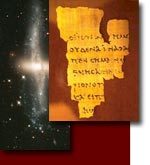| Site Map | Contacts | Links | Newsletter | |
Genesis 1:5-8 DAY 1
Heavens Stretched Out
Hebrew Text
The heavens and earth are said to be stretched out at creation. The Hebrew word hfn is used for the heavens while the Hebrew word uqr is used for the earth.
The Hebrew word hfn occurs ten times in the OT in the context of God stretching out the heavens. It is used five times in the book of Isaiah (40:22, 42:5, 44:24, 45:12, 51:13). It also occurs in Job 9:8, Psalm 104:2, Zechariah 12:1 and in Jeremiah 10:12 and 51:15. In Jeremiah hfn is used as a Qal perfect, which means the "stretching" is past completed action. In all other references it is a Qal participle. The participle indicates continuous action; however, the context of these verses show that they are also past completed action at the time of creation.
The spreading of daylight at dawn may have suggested the idea of the firmament being spread out since this is what the Hebrew word uyqr means. The heavens are also said to be rolled out as a scroll (Isaiah 34:4; Revelation 6:14).
In Isaiah 40:22 the heavens are stretched out like a qd, thin veil. Delitzsch explains it as a thin fabric like a thin transparent garment (Keil and Delitzsch 1976, 152). In the next phrase it is like a lha, tent, This is the usual word for tent which was made out of stretched animals skins. In Psalm 104:2 it is described as a juyry curtain. This word is used for the curtains of the tabernacle (Ex 26:1) and curtains of tents in general (Jer 4:20; BDB 1980, 438). In other places hfn is used to describe the spreading, or pitching of a tent (Gen 33:19 and Ex 33:7). The main way of putting up a tent was to stretch out the animal skin over the poles, and then fasten them down.
Psalm 104 parallels the order of creation in Genesis one. The first verse and the first part of the second verse describe day one. Verses 2b-4 describes day two, and verses 5-9 describes day three. Psalm 104:2b says, "he stretches out the heavens like a tent." Herder comments, "They represent God as daily spreading it (heaven) out, and fastening it at the extremity of the horizon to the pillars of heaven, the mountains" (Perowne 1976, 235). Verse three says, "and he lays the beams of his upper chambers on their waters." The Hebrew word for "upper chambers" is hylu which means "roof-chamber" (BDB 1980, 751). It is used in I Kings 17:19 and 23. In Nehemiah 3:31-32 it is used for a roof-chamber with walls over a gateway. It is also used in Solomonís temple according to 2 Chron 3:9. In Psalm 104:13 it explains that the upper chambers contains water which God rains down upon the earth. The beams of the upper chambers are probably laid on the waters that are above the firmament to contain the waters for whenever God wants to let it rain; however, it could mean that the support beams of the firmament are founded upon the waters on earth. In Amos 9:6 the firmament is founded upon the earth.
In Job 26:7 it says that God stretched out the North, or heaven over the void, or deep. I think that the context indicates that the "north" is used synonymously with heaven. The part is used for the whole. First of all the word hfn is used only to describe the heavens, not the earth. The parallelism of heaven and earth is common, and to be expected. The Hebrew word for "north" is /px (BDB 1980, 860). In Ugaritic the word spn refers to the mountain on which Baal lived. According to Savignac /px in the OT can mean "cloudy sky" (Savignac 1984, 273-78; OT Abstracts 1968, 154). The basic meaning is "wind accompanied with clouds" (Ibid). Therefore, /px refers to the northern or cloudy sky. The part is used for the whole of heaven. The "void" is the same word that is used in Genesis 1:2. It is the Hebraic way of poetically describing the creation of the world. It was also polemically against foreign views. This stretching is probably describing what happened on the second day of creation. The firmament is stretched upward or pushed up to separate it from the watery deep below. In the beginning there was just the watery deep. Now God separated the waters. On the third day God spread out the earth over the deep.
Akkadian Literature
There is an interesting parallel with an Akkadian phrase in the Poem of the Righteous Sufferer which says, "Wherever the earth is laid, and the heavens are stretched out" (e-ma sak-na-at ersetim rit-pa-su same; Lambert 1960, 58-59). So in Mesopotamia the heavens were also seen as being stretched out.
One should not read into this modern science, like the expansion of the universe, or the Big Bang theory.
In Enuma Elish the heavens are like a roof of a house that is put over our heads. Heidel translates, "Half of her (Tiamat) he set in place and formed the shy (therewith) as a roof" (Tablet IV:138; 1942, 42).
Egyptian Literature
The Hymn of Amon-Re states, Who suspended the heaven, who laid down the ground, Father of the fathers of all the gods, Who suspends heaven, who laid down ground" (COS, 38-9). Wilson translates, "Raised the heavens and laid down the ground" (ANET, 365).
Next - Genesis 1:9-13 -
Creation of the Seas and Earth
Bibliography
